Key Takeaways
- In fall 2014, Austin Community College (ACC) launched the ACCelerator — a large, technology-enabled learning environment — at its new Highland Campus, which formerly housed an Austin shopping mall.
- The ACCelerator's technology has enabled ultra-personalized learning, turning the spacious environment into a modern incarnation of the one-room schoolhouse.
- ACC's pedagogy has shifted to focus on the individual student and offer immersive student services; the result is a state-of-the-art center for innovative learning, training, and community engagement.
At the community college level, encouraging persistence and nurturing success benefits all students, but there is a particular focus on students who have historically performed below average in success and persistence — developmental and minority students. To tackle this issue, Austin Community College (ACC) decided to think big — unifying a variety of programs and services in a single room the size of a football field.
ACC's 32,000-square-foot ACCelerator lab resides in a former shopping mall (figure 1) and offers more than 600 virtualized desktops for scheduled classes, individualized learning, and small group sessions (figure 2). In addition to technology-based instruction, the ACCelerator features an extensive support network of faculty members, academic coaches, counselors, advisors, tutors, librarians, and other staff members — all of whom stand ready to help students succeed by providing student-centric, proactive services.
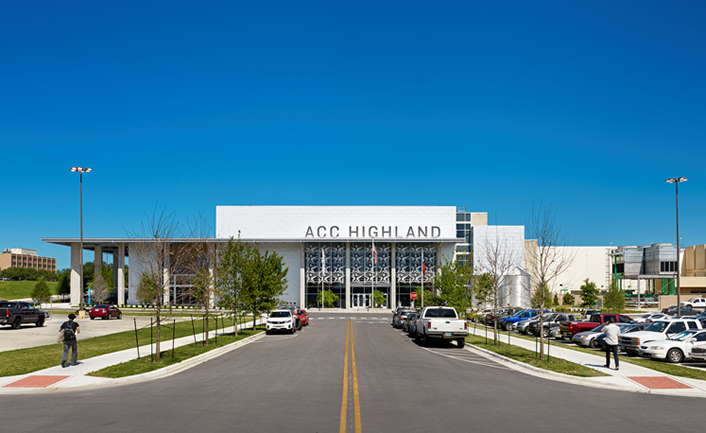
Courtesy of Casey Dunn Photography
Figure 1. The ACCelerator inside a former shopping mall
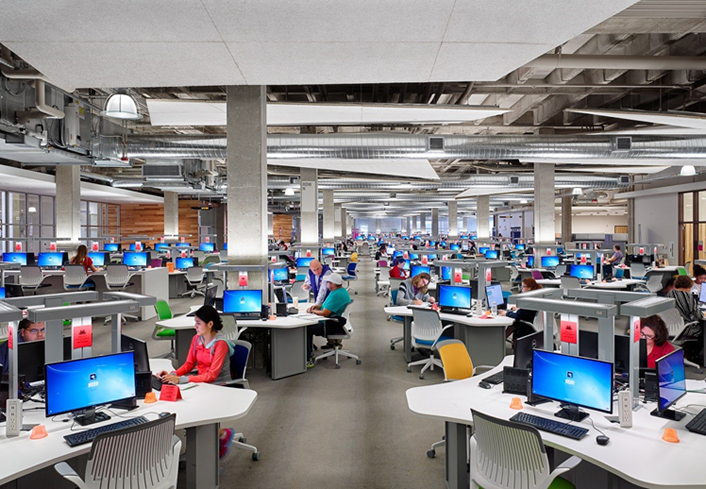
Courtesy of Casey Dunn Photography
Figure 2. Virtualized workstations
The ACCelerator is an experiment in redesigning the student experience. Planning began in 2011, when ACC purchased and redeveloped Austin's Highland Mall. This new space led ACC to rethink the old paradigm, in which students accessed instruction at point A, met with advisors at point B, and sought tutoring at point C. At the ACCelerator campus, student-centered learning is a logistical and physical fact. Colleagues from across departments and from both sides of the house — academic and student services — work in the space. That space, combined with technology, allows ACC to ultra-personalize learning. For example, in the Developmental Math Program [https://sites.google.com/a/austincc.edu/math-students/courses/matd-0421] — the first class launched in the ACCelerator — students work at an individualized pace rather than in lock-step, and coaches and instructors who share the space help students individually as the need arises.
By literally removing the walls between educational silos, the ACCelerator's wide-open space facilitates collaboration and a true focus on the student. This "emporium" model is hands-on and requires face-time; it's much like a high-technology, modern, one-room schoolhouse. The technology has allowed ACC to do many of the things we've wanted to do for a long time, but couldn't do at this scale. Not only are students happy with the environment, faculty members have thrived. They now choose to be in the ACCelerator instead of holding traditional office hours, because they have conferencing time and more interaction with students. Overall, everyone feels a sense of camaraderie and teamwork they haven't experienced on a traditional campus.
ACCelerator Fast Facts
Opened: Fall 2014
Location: Austin Community College Highland Campus (formerly the Highland Mall)
Purpose: Provide technology-based instruction with an extensive support structure of faculty, academic coaches, counselors, advisors, tutors, librarians, and other staff — all of whom proactively and holistically support student access to higher education and their ultimate success
Size: 32,000 square feet (longer than a football field!)
Features: A large, open space filled with clusters of desktop computer stations and computer bars and surrounded by glass-walled classrooms and group study rooms
Equipment: 604 Dell Computers powered by a desktop virtualization solution; 13 Apple MacBook Pros; 12 Apple Mac Minis; and 6 SMARTboards
Hours of Operation: Monday–Thursday, 7:30 a.m. to midnight; Friday, 7:30 a.m. to 10:00 p.m.; Saturday, 8:00 a.m. to 7:00 p.m.; and Sunday, noon to 6:00 p.m.
Visits: more than 13,000 unique students and more than 175,000 visits to the ACCelerator in its first year of operation
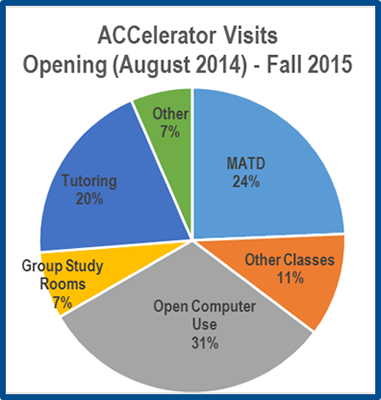
Student visits to the ACCelerator in its first year of operation
Adaptive Reuse
The opportunity to redevelop and reimagine processes when old or status quo approaches become mundane or irrelevant often inspires innovation. From the outset, the ACCelerator project inspired an adaptive mindset.
The Highland Mall sat at a highly desirable intersection of roads and public transportation, just up the street from the University of Texas at Austin. However, the economic downtown, the flight of retail to the suburbs, and the popularity of online shopping all eroded the success of what was for many years the hub of culture and life in the region and a bustling center of activity and community. One by one, anchor stores began closing, and by 2010 the mostly-deserted mall became the blight of the neighborhood.
ACC's administrative headquarters were next door to the mall, and the lure of additional space to alleviate overcrowding at nearby campuses — combined with all that parking! — led to interest in purchasing the first anchor store building. However, a local developer also saw the land as ideally situated for an extension of its existing mixed-use community they had redeveloped at an old airport nearby. When both parties realized that working together could deliver a regional hub for higher education and a vibrant mixed-used community, ACC formed a private-public partnership to redevelop the original mall into a flagship 1.4 million square-foot campus as the center for a 1.9 million square-foot mixed-use community.
Many first-time college students feel intimidated about going to a traditional college campus, but no one is intimidated about going to the mall. Students have memories of visiting the space in its previous incarnation and the sense of community it brought; we are fortunate to capitalize on this in the mall's new role today.
The wild idea of using a failed shopping mall as a college campus also gave ACC license to think creatively. We started by focusing on how people interact in educational settings. The potential to be all under one roof would offer many opportunities to share in the educational experience. We thus began to think about new ways to integrate instruction and student services into the revived spaces and serve our students in new ways.
Education Reimagined
Most students arrive at community colleges not yet ready for college-level work, particularly in math. Further, relatively few students complete the traditional sequence of required developmental math courses, which has a dismal effect on student success. Thus, one of ACC’s initial goals for the space was to redesign the traditional developmental math sequence. In fall 2014, ACC introduced Developmental Mathematics [https://sites.google.com/a/austincc.edu/math-students/courses/matd-0421] in the newly opened Highland Campus ACCelerator. The course features web-based software called ALEKS (for assessment and learning in knowledge spaces) that combines
- adaptive instruction in a scheduled session with an instructor;
- 100 hours a week of tutor support; and
- academic coaching to boost metacognitive skills — such as time management and organization — that are vital to student success.
Instruction Re-inspired
The ACCelerator space initially focused on the redesigned developmental math curriculum, but faculty members from multiple areas wanted to experiment with instruction. No faculty members were required to change or move to the new campus, but many were inspired to do so. In addition, various areas that already incorporated online learning appreciated how the ACCelerator space supported instruction and student interaction. As a result, ACCelerator instruction expanded in many ways:
- Visual Communications/Game Development, Animation, and Motion Graphics. The ACCelerator now houses ACC's entire Game Development, Animation, and Motion Graphics department. Motion graphics uses the principles of graphic design to bring together special effects, animation, fine art, compositing, type design, music, and live elements to create motion graphics sequences that independent filmmakers, advertising agencies, TV networks, video game companies, and others need to make their work more visually exciting. Students learn Adobe Creative Suite Production Premium package, including After Effects; Maxon Cinema 4D Broadcast Bundle; Apple Final Cut Studio [https://www.apple.com/support/pro-apps/], Trapcode Effects Suite; and Avid Pro Tools. The Visual Communications department also offers graphic design courses at the ACCelerator.
- Adult basic education. ACC's Adult Education Divisionoffers classes in the ACCelerator in English as a second language, literacy and civics, and GED preparation. The programs are designed for native and non-native speakers who want to improve their language skills and gain the core academic skills needed to obtain a GED. Because the GED is now offered in a computer-based format, leveraging the computers in the ACCelerator is essential.
- Continuing education. Continuing education often offers courses at the ACCelerator, including Medical Terminology, College Transitions, and Computer Literacy.
- Ad-hoc scheduling. Faculty members from many departments who teach in traditional classrooms require their students to use computers throughout the semester. In fall 2015, ACC began requiring a student success course for all first-time college students. For this course, faculty members meet in the ACCelerator with their students to work through online modules such as Pearson's My Student Success Lab, Campus2Careers, and Focus 2.
- Project-based learning. A variety of instructors at the Highland Campus regularly schedule classes in the ACCelerator to use the computers for project-based learning. For example, a speech class might meet in the ACCelerator to research elements required for an assignment.
- Library instruction. ACC reference librarians are faculty members who provide instruction to classes in ways that integrate resources to support student learning. Library instruction sessions are regularly scheduled in the ACCelerator for various subject areas.
- Open computer lab. The ACCelerator is the only open computer lab on the Highland Campus, and — as the "Fast Facts" sidebar shows — it remains open beyond regular campus hours. This increased access ensures that students always have a place to work with access to technology, software, and support. Also, ACC is a one-college system with 11 different campuses, and the centrally located ACCelerator attracts students from across the college's service area.
- Maker meetups. The ACCelerator kicked off meetings for students interested in learning coding using kits that they can check out from the ACC library. Those kits include Arduinos, Raspberry Pi, and various sensors. One student group has even created a mascot — called XL Raider — from hacking into a Roomba.
- Early-college high school. The Highland Campus currently serves students from the Austin Independent School District and the Manor Independent School District early college high schools, hosting orientation activities and serving as an IT resource. Other local high schools have also reached out to the ACCelerator for instructional support. For example, students from two other high schools participated in a supply chain simulation at the ACCelerator using software developed by a local company, VChain Solutions [http://www.vchainsolutions.com].
- Intensive English institute. In 2016, ACC plans to launch an Intensive English Program that offers F1 (full-time student) visas. The program will meet in the ACCelerator classrooms and use technology to work with international students as they begin their studies at ACC.
- Developmental reading/writing/math. In addition to the developmental math curriculum, the ACCelerator offers developmental reading and writing. Students in these courses regularly meet in a small classroom and then spend their lab time at the computer pods with adaptive software and tutoring support.
- English composition. English faculty members have piloted a course redesign that integrates both a classroom and a lab component. The entire class is based in the ACCelerator and uses the computer pods and adaptive technology.
- Computer-aided design and geographic information systems. CAD and GIS courses are taught at the ACCelerator's computer pods and supported using its interactive whiteboard.
- Competency-based accelerated computer training. In October 2012, ACC received a US Department of Labor grant to develop Accelerated Programmer Training (APT), a competency-based education (CBE) course in computer IT. Over the past year, 55 students earned a degree or certificate through APT — a 50 percent increase in the completion rate for computer IT/computer science students. In fall 2014, 89 percent of program graduates either found jobs or continued their education. ACC is now offering that course, fully online previously, in a hybrid delivery model in the ACCelerator through both the new IT Career Academy and Career Expressway.
- IT Academy dual-credit students from LBJ, Reagan, and Del Valle high schools are also taking part in the Accelerated Programmer Training program.
- Career Expressway is a partnership between ACC and nonprofit Capital IDEA designed for unemployed and underemployed adults which combines accelerated instruction for select in-demand careers (such as computer support) with financial assistance, support services, and internship opportunities.
Students Reengaged
Working with students in this new environment allows ACC to integrate both academic and non-academic outreach and support in a holistic approach that treats students as individuals to optimize their success. Student services no longer occupy a single office; staff mingle with instruction throughout the space. Among the student services embedded in the space are the following:
- Academic coaching. Academic coaches seek to develop a rapport with students built on trust and respect for their unique goals and strengths. During private meetings or small group settings, students learn time management, self-advocacy, motivation, goal clarification, reading comprehension, study skills, and the development of personal plans for academic success. Today, coaches have already held sessions with more than 1,000 students.
- Supplemental instruction. Supplemental instruction (SI) is a nationally recognized academic support model that uses peer-assisted, regularly scheduled, out-of-class study sessions for traditionally difficult academic courses.
- Peer coaching. This type of coaching broadens and builds on SI to support a wider range of courses. The peer coach's mission is to embed in the classroom and serve as a kind of teaching assistant, particularly in courses that have "flipped the classroom." Peer coaches also proactively engage with students who might not otherwise seek tutoring or support outside of class.
- Students "self-cohortizing." Several groups of students have "cohortized" themselves into study groups. For example, nursing students regularly meet at the ACCelerator after clinicals to study, even though no nursing courses are held at this campus. Staff members also regularly introduce students interested in health sciences to "ninja study skills" that can help them succeed in the program.
- AARP Back to Work 50+ at ACC. The ACCelerator hosts the AARP's Social Innovation Fund/Back to Work 50+ Women's Economic Sustainability Initiative. ACC is one of only five community colleges nationwide to receive the grant funding for this program. One of the program's key components is helping students acquire the computer literacy skills needed to reenter the workforce. Through this initiative, ACC seeks to serve the community's unemployed and underemployed women aged 50–64 , supporting them in building the confidence, skills, and opportunities they need to find full-time employment, improve their financial capability, and avoid poverty later in life.
- Community partner Capital Idea. Capital Idea's mission is to lift working adults out of poverty and into living wage careers through education. The nonprofit is co-located at the Highland Campus and offers a range of sponsorship services to eligible participants. Capital IDEA's College Prep Academy partners with ACC to offer courses in the ACCelerator as an on-ramp for students seeking to enter training in high-demand fields such as the health sciences and IT.
- Small group study rooms. The ACCelerator offers 14 small group study rooms for ACC community members to use. Faculty often reserve rooms for conferencing hours or study groups. Many of the study rooms have glass walls (figure 3), allowing the positive peer pressure of study groups to seep into the overall environment.
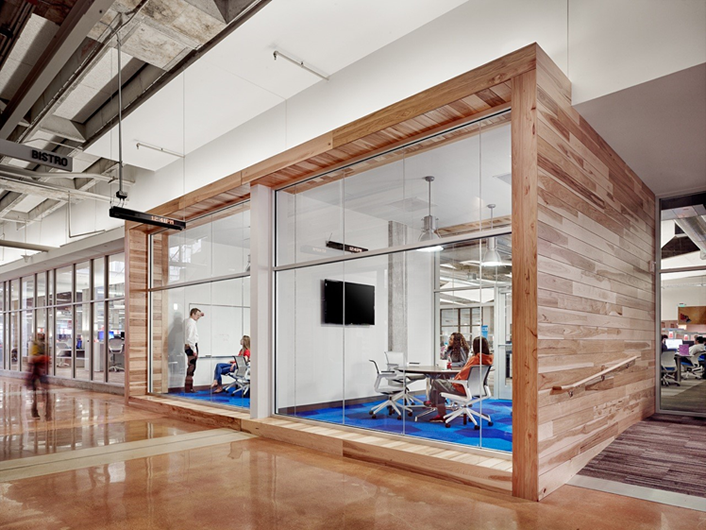
Courtesy of Casey Dunn Photography
Figure 3. Glass-walled study rooms
- Google tools for education outreach. ACC is a Google school. As such, each student can access all of the Google Tools for Education. Academic coaches have been trained as Google Certified Educators and have developed a curriculum through which they can introduce students to the tools and support their success.
- Student Life. ACC's Department of Student Life regularly uses the ACCelerator as a resource to support its activities. For example, Student Life sponsored a Holiday Art Slam in which students used the large glass windows as a canvas for painting, creativity, and stress relief during their busy exam season. Additionally, the academic coaches are partnering with the First Year Experience program to support students in acquiring the skills needed to succeed at ACC.
- Tutoring. Free tutoring in a range of subjects is offered 72 hours each week, and math tutors are available whenever the ACCelerator is open (nearly 100 hours a week).
- Student clubs. Student clubs regularly use the ACCelerator to promote and hold meetings and events.
- FAFSA frenzy. Students can complete their Free Application for Federal Student Aid (FAFSA) in the ACCelerator under the guidance of financial aid specialists.
- Community outreach. The ACCelerator serves as a resource for the local community and has been used to provide support for Feria Para Aprender (the largest Spanish-language education fair in Central Texas), computer badges for local Girl Scout troops, and meeting spaces for local nonprofit groups.
- Chat with a counselor. Counselors regularly circulate through and hold office hours in the ACCelerator, proactively reaching out to students to build rapport and create awareness about counseling services.
Although the ACCelerator launched with the goal of integrating technology into instruction, the technology allows for outreach and engagement of students in new ways by embedding all available resources into the space and working collaboratively across all ACC branches. Many students arrive struggling not with the instructional content, but rather with what it means to be a student. The ACCelerator focuses on learning how to learn.
Seeing Results
By the end of the fall 2015 semester, the ACCelerator had served nearly 13,000 unique students in more than 173,000 visits. All students who visit the ACCelerator show increases in both success and retention, most significantly minority and developmental students. The equity gap that exists between different groups is narrowing. The interaction and technology mean that students who have mastered the art of being invisible in a traditional classroom are not allowed to "hide." Students have responded to this space by coming, staying, and returning.
Unifying instruction and student services in the ACCelerator space and changing the way ACC proactively reaches out to students has already had a significant impact on student persistence and success:
- ACC students enrolled in any fall 2014 class who attended the ACCelerator were more likely to persist to spring 2015 (21 percentage points) and fall 2015 (16 percentage points) than non-ACCelerator students.
- Students enrolled at ACC in fall 2014 for the first time who attended the ACCelerator were more successful in developmental courses (that is, they earned As, Bs, or Cs) than non-ACCelerator students by 19 percentage points. The differences were most pronounced for African-American females (27 percentage points) and males (23 percentage points).
Figure 4 shows the success rates for female developmental students using the ACCelerator; figure 5 shows the success rates for male developmental students.
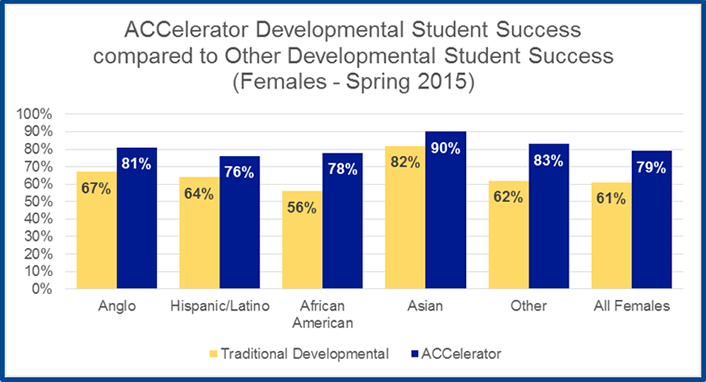
Figure 4. Developmental student success rates for women (spring 2015)
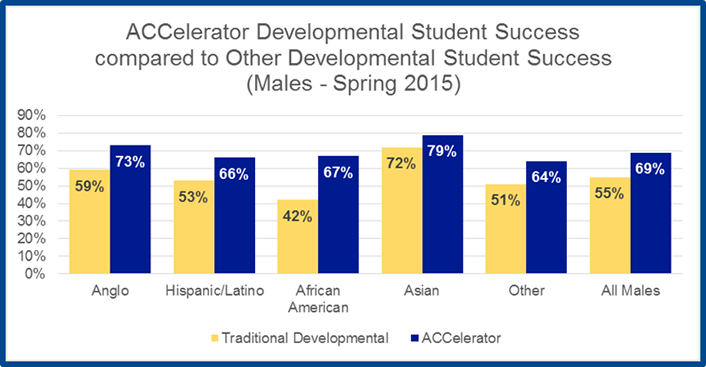
Figure 5. Developmental student success rates for men (spring 2015)
Looking Ahead
A successful fall 2014 bond issue approved a new ACC campus at Leander, as well as renovations at existing campuses. New (albeit smaller) ACCelerators will be included as part of the Leander campus, the Round Rock campus expansion, and the Rio Grande campus renovation. And, at all ACC campuses, the lessons learned about how to leverage technology and integrate instruction and student services will continue to inform practice.
Technology is changing the way ACC provides access and supports success throughout the entire community. With this exceptional tool, greater connections within the diverse student population can "ultra-personalize" the learning experience. The community college system is central to the ability to effect change in local communities. Through the ACCelerator, ACC is adopting new ways of connecting with students, and changes in the world really are happening here — one student at a time.
ACCelerator Students Tell Their Stories
Hope is the first thing that a community college education should give its students. One ACC student, Rafina, pulled aside author and ACCelerator Director Stacey Güney the first week of class. "I'm 52 years old, and I had given up on my dreams of being a nurse. But I can do math now in this program. You have given me my hope back." Leveraging technology to empower learners gives them hope that they can achieve their dreams through education, as the following students attest.
Jesus Arreola
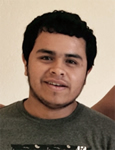 The first person in his family to attend college, Arreola graduated from an alternative high school and came to ACC unprepared for college-level classes. He needed several semesters of developmental reading, writing, and math. Few community college students who begin with all three developmental subjects make it to college-level courses.
The first person in his family to attend college, Arreola graduated from an alternative high school and came to ACC unprepared for college-level classes. He needed several semesters of developmental reading, writing, and math. Few community college students who begin with all three developmental subjects make it to college-level courses.
"Because of the support in the ACCelerator, I completed all of these required classes in one year. This fall, I completed college-level English and Algebra (with two As!), and I am looking forward to transferring to a four-year university to study architecture or engineering."
Febe Garrett
 Originally from Namibia, Garrett recently completed her first semester at ACC’s Highland campus and plans to get an associate's degree in computer science. She uses the ACCelerator for coaching, tutoring, classes, and the computers.
Originally from Namibia, Garrett recently completed her first semester at ACC’s Highland campus and plans to get an associate's degree in computer science. She uses the ACCelerator for coaching, tutoring, classes, and the computers.
"Actually, coaching has helped me a lot to improve my English and also to write my essays. And as for math… I use it for math because when I came here and didn’t even know how to do one plus one is two, but now I can do all math problems."
Tohi Likam
 Just a year out of high school, Likam plans to major in process technology en route to becoming an engineer. He came to the ACCelerator to take a math course through ALEKs; he also takes advantage of coaching, tutoring, and study rooms to help with his other course work.
Just a year out of high school, Likam plans to major in process technology en route to becoming an engineer. He came to the ACCelerator to take a math course through ALEKs; he also takes advantage of coaching, tutoring, and study rooms to help with his other course work.
"There's no reason you should be failing a class. I mean there's ACC, the ACCelerator, the coaches, counselors, the advisors — everybody's here to help you. You just got to put your mind to it and do it. And you'll get it right. Yeah. I'm really thankful for that."
Isaac Williams
 Isaac Williams is graduating from ACC this spring in business and accounting. He is a big fan of both the ACCelerator program and its facilities. He does have one suggestion for improvement, however:
Isaac Williams is graduating from ACC this spring in business and accounting. He is a big fan of both the ACCelerator program and its facilities. He does have one suggestion for improvement, however:
"We are respectfully requesting 24-hour access, seven days a week. That would help us so much. That is our next step I hope! It is just beautiful … really."
Stacey Güney is director of the Highland Campus ACCelerator at Austin Community College and an adjunct professor in Student Development. She holds an undergraduate degree in Math, Physics, and English from Greenville College and a master's of Science in Engineering from Washington University in St. Louis. Güney is currently a doctoral student at the University of North Texas Department of Learning Technologies. Her current research interests include neuroscience and non-cognitive skill development in instructional design, responsible use of technology in education, and the use of technology in math instruction. The ACCelerator is the recipient of the 2015 Campus Technology Innovators Award in IT Infrastructure and Systems and a finalist for the 2016 Bellwether Award in the Instructional Programs & Services category.
© 2016 Stacey Güney. This EDUCAUSE Review article is licensed under Creative Commons BY-NC-ND 4.0 International.
